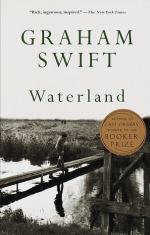|
This section contains 6,063 words (approx. 21 pages at 300 words per page) |

|
SOURCE: "History, His Story, and Stories in Graham Swift's Waterland," in Studies in the Literary Imagination, Vol. XXIII, No. 2, Fall, 1990, pp. 197-211.
An American educator, editor, and critic, Landow frequently writes about Victorian literature and writers as well as on issues regarding hypertext and electronic publishing. In the following essay, he discusses Swift's emphasis on history and storytelling in Waterland, classifying the novel as a late twentieth-century example of fictional autobiography.
Children [are those] to whom, throughout history, stories have been told, chiefly but not always at bedtime, in order to quell restless thoughts; whose need of stories is matched only by the need adults have of children to tell stories to, of receptacles for their stock of fairy-tales, of listening ears on which to unload, bequeath those most unbelievable yet haunting of fairy-tales, their own lives. [Waterland]
Graham Swift's Waterland (1983), a novel cast in the form of...
|
This section contains 6,063 words (approx. 21 pages at 300 words per page) |

|


